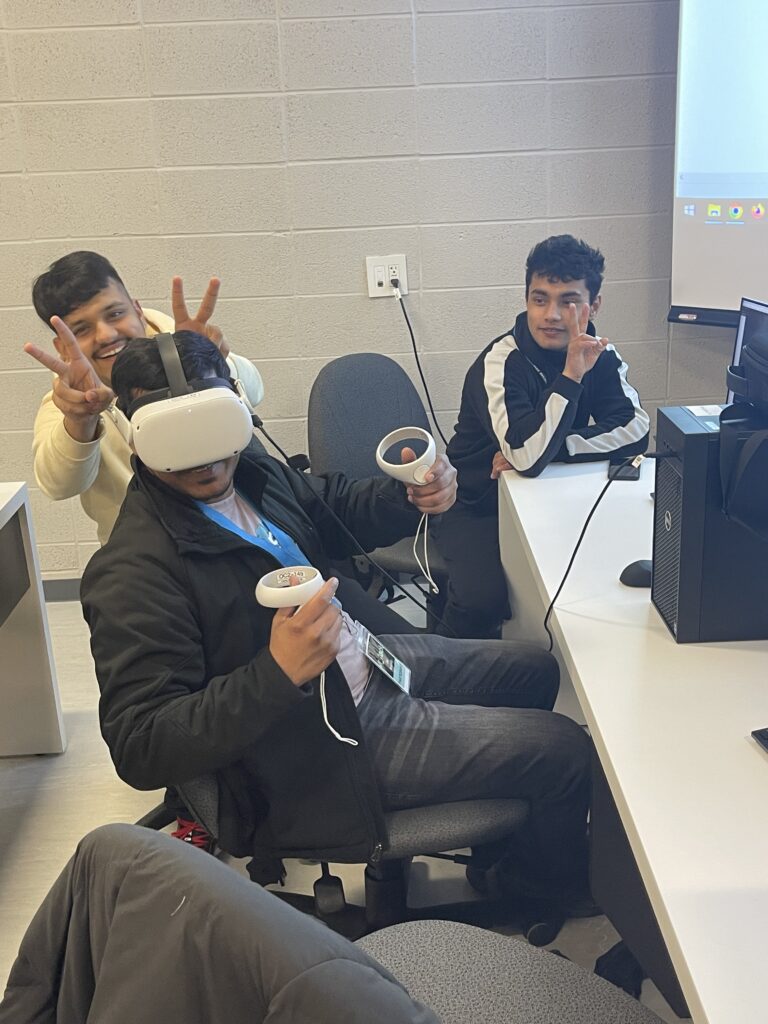Georgian vr_HACK provides an immersive learning experience
March 21, 2023
It’s not often you get to sleep over at a college campus. Recently, close to 80 students and approximately 30 volunteers spent the night at Georgian’s Barrie Campus to participate in a virtual reality (VR) hackathon.
Students put their creativity, collaboration and problem-solving skills to work, producing and showcase exciting and innovative solutions in support of the United Nations Sustainable Development Goals.
Georgian’s vr_HACK, hosted by the Henry Bernick Entrepreneurship Centre (HBEC), engaged student teams in 30 hours of deep, interdisciplinary learning and collaborating guided by a team of top-notch faculty and industry mentors.
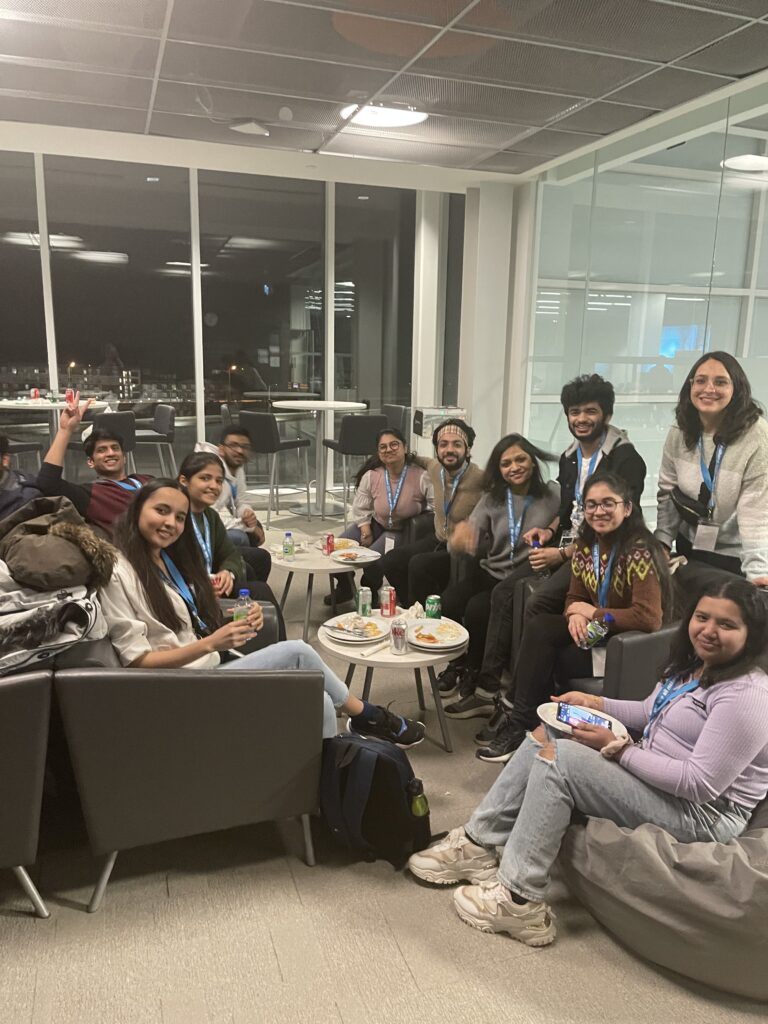
This was more than an event. It was a great example of the kind of immersive learning experiences Georgian offers, and we continue to build in our approach to all activity organized by HBEC. In collaboration with our Research and Innovation department, we’re brainstorming new opportunities for students, employees and community members to support the United Nations Sustainable Development Goals through future hackathons like this. The energy, collaboration, friendships and connections made were exciting and, for many, life changing.
– Sara Bentham, Director, Henry Bernick Entrepreneurship Centre, Georgian College
Grounded in human-centred design, the event provided an opportunity for students to deepen their skills while applying knowledge and concepts learned in their disciplines. Computer Science students teamed up with Business and Management and Big Data Analytics students to leverage various perspectives and knowledge exchange.
The teams chose from a variety of challenges and developed an exciting array of prototype VR applications – any of which could have been the winning idea:
- Innovating Workplace Hazardous Materials Information System (WHMIS) training through an engaging VR experience
- Addressing language training for newcomers and social isolation among seniors through an engaging VR experience
- Building safe and effective employee training modules using VR
- Improving health, fitness and dexterity through a VR experience
- Training flight attendants through crisis situations using VR
Taking a chance
“We took a chance hosting Georgian’s first-ever sleepover,” says Virginia Barlow, Georgian’s Digital Innovation Specialist. “We weren’t sure how it was all going to work out, but it was worth a bit of creative risk-taking to make it all happen. I attended previous hackathons where people slept over and it was a really cool experience, so I wanted to bring it to the college. I knew it would be meaningful for students and something they could remember as part of their Georgian experience. We’re always encouraging them to take risks, so we wanted to model that too.”
The students divided into 15 teams of four or five and worked through the night learning how to build something from start to finish, and then pitching their idea to a panel of judges.
Everyone who participated was a winner in my books because they were so proud to have produced amazing innovations in just 30 hours. Plus, they were fed, received free swag and got to meet people from other programs, departments and institutions and forge lasting friendships. We did cup stacking, people shared ghost stories from around the world – which was really cool – and other fun activities to keep students awake and occupied. We also provided resources to help them with their resumés and a photographer who took headshots for their LinkedIn profiles. To top it off, we gave away prizes for some silly things like ‘who asked Virginia the most questions!’’
– Virginia Barlow
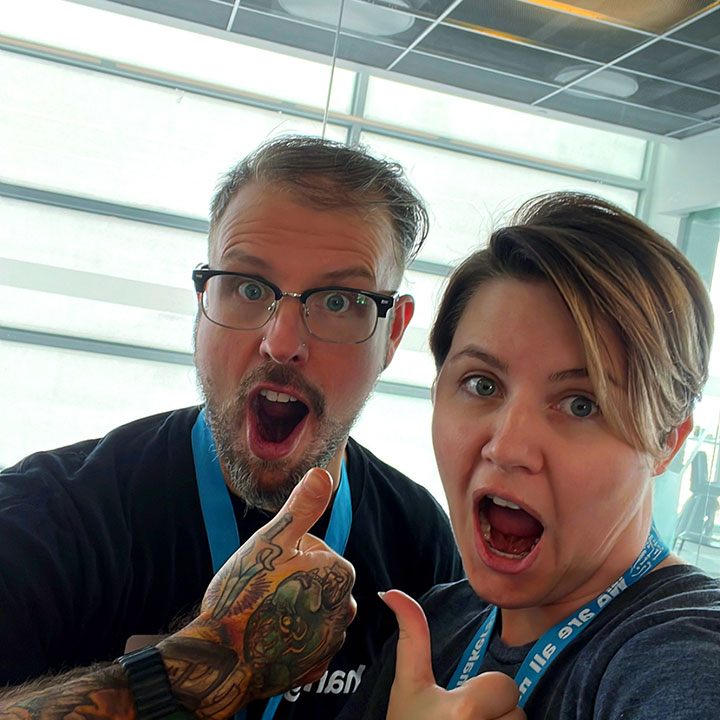
Mentorship, coaching and interdisciplinary learning
Ross Bigelow, Program Co-ordinator for the Honours Bachelor of Science in Computer Science Degree with Computer Programming Diploma and Artificial Intelligence – Architecture, Design, and Implementation programs at Georgian, was one of the mentors who stayed overnight.
“We encouraged interdisciplinary learning, which is an important and emerging theme in Georgian’s academic planning,” says Ross. “One of the big pieces of the event was the actual creation of the teams. Ryan Burwell, Director of Training and Facilitation from Twenty One Toys, facilitated this process, which made everyone feel included, comfortable and part of a team. Some came with a bit of VR knowledge, but we provided a number of talks, workshops, faculty coaches and mentors who helped all the teams.”
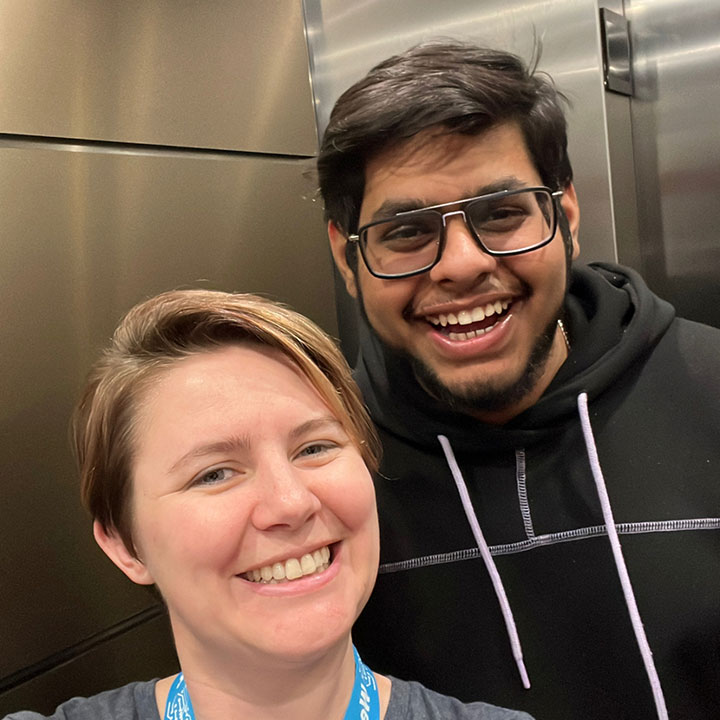
Tom Tsiliopoulos and Wallace Balaniuc, who teach in Georgian’s Game – Design and Simulation program, gave a fantastic workshop on using Unity, which was the game engine used for the event. Organizers pulled from multiple areas across the college and every team had their own VR headset. For some students, it was the first time they’d ever used one.
Other hands-on workshops included:
- Pitch Prep with John Pickard, GAN Angel Investor, Accolade Innovations Inc.
- Audio in VR and When to Use It with Tony Pickard, award-winning Georgian faculty recently chosen as chosen as this year’s recipient of the James Bailey Award by New Adventures in Sound Art in recognition of his inventive spirit and for pushing the boundaries of radio and transmission art
- VR Graf¬ti Experience with Adam Dagenais, a multi-media co-ordinator with social innovation at Georgian
- Assets for VR and Where to Find Them with Steve Benoit, Georgian faculty
Alexander Theodorou, Founder and CEO of Neurofit, also delivered an inspiring keynote on navigating the start-up journey.
Any time you have these extracurricular type of learning activities that are engaging, students tend to learn more quickly and have fun at the same time. Plus, with many students learning remotely over the past three years it was wonderful to have this interactive in-person event where everyone could network, learn some valuable skills, and meet new people. Friendships were made with everyone meeting people across different programs. It was an exciting event that truly embodied belonging and inclusion.
– Ross Bigelow
Ross adds that it was also a high-pressure event with a quick turnaround where you don’t have a lot of time to think about what you can’t do – but what you can do.
“We were well stocked on the mentorship side and everyone who participated received coaching and mentoring from faculty and industry professionals,” says Ross. “I think I logged more than 30,000 steps over the course of the event! We took learning out of the classroom and students experienced everything from problem solving and teamwork, to leadership and getting out of their comfort zone.”
Ross, Virginia and Sara stayed over along with volunteers from the Georgian College Students’ Association, peer mentors and the Segal International Centre.
What did students think?
When I volunteered to help with vr_HACK, I didn’t really know anything about it. I was just trying to help fill a need for overnight volunteers. After hearing the passion and excitement that the teams had when they explained their ideas to me, I knew I wanted to stay through to the end. I’m so glad I did because I got to see the heart of the event…the participants working through the night to make their ideas the best they could be, the organizers doing everything they could to support those ideas, and the judges offering the best encouragement and advice! I would volunteer again in a heartbeat!
– Rebecca
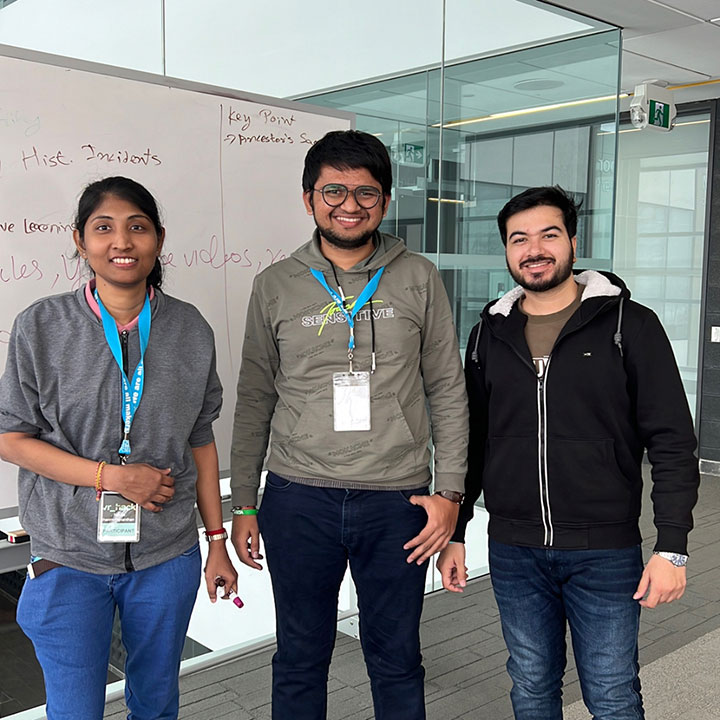
Those 30 hours were the craziest of my life, but I’m so glad I did it.
– Andrew
It was a super amazing team building event. I enjoyed meeting everyone and the food was great!
– Aleksandr
The winning team included Georgian students Shelgir Aziz and Miran Qarachatani, University of Waterloo students Azwad Abid and Wachirawit (Pete) Umpaipant, and Aran Fatih, Senior Software Engineer at ViV Technologies. Their pitch centred around an employee training solution, using a cost-effective modular VR system to reduce training time and enhance learning retention. The prototype was interactive, engaging and the judges thought less stressful since no real damage is done if a mistake is made in the virtual world.
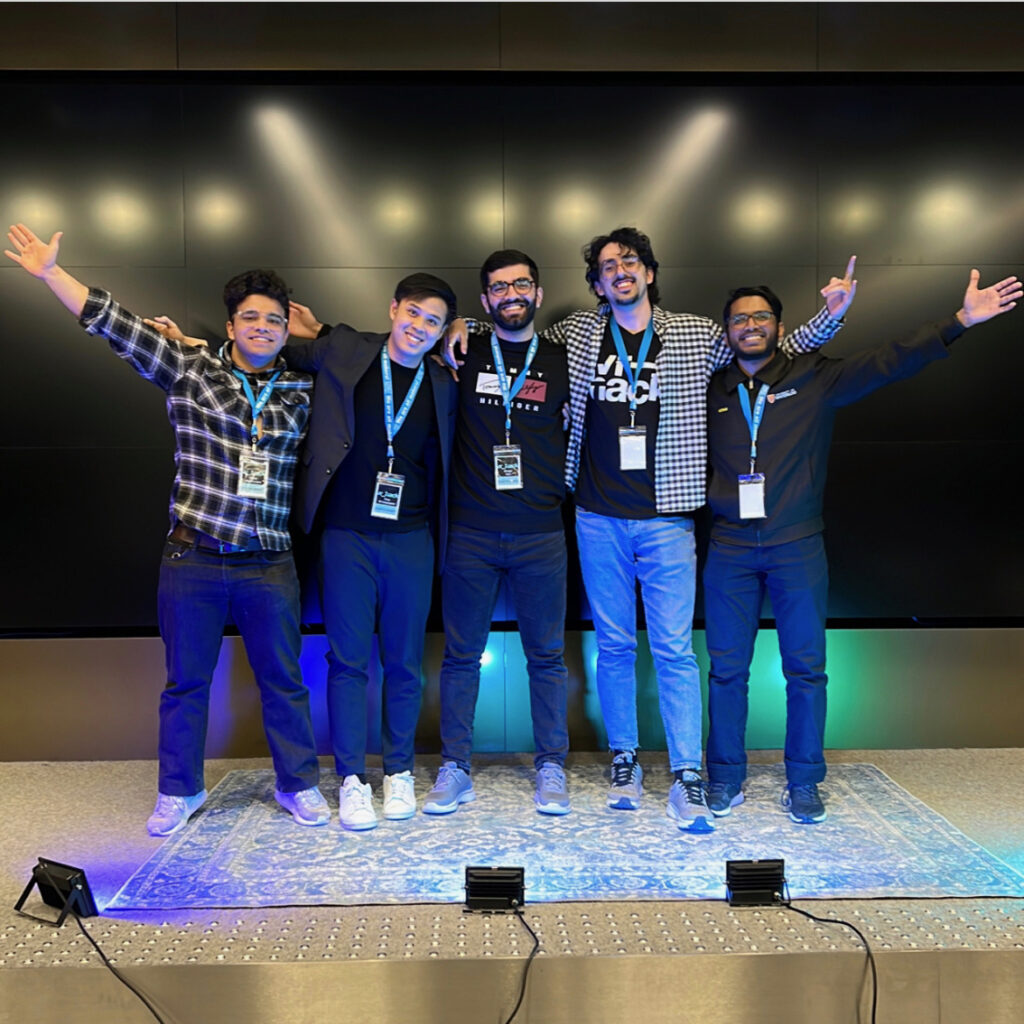
Miran Qarachatani, first-year Lakehead-Georgian student, and Shelgir Aziz, Big Data Analytics student, both loved the vr_HACK experience.
“Participating in this event allowed us to collaborate, get to know other people in the field, plus innovate and create something that has the potential to change people’s lives,” says Shelgir. “Hackathons provide this unique opportunity for us to grow our skills in many different fields. And working with a group of people, trying to create something new that could eventually make a positive impact on the local communities and the world is very appealing.”
Miran says it’s hard to explain what he enjoyed most about the experience because he just loved everything.
“I learned a lot about VR and how games are developed using game engines,” says Miran. “I also learned about brainstorming and collaboration. Having the mentors listen to our pitch and give us feedback was invaluable – both for the hackathon and pitching in general. However, the best advice I got and the biggest takeaway the talk about how scarcity and pressure create creativity. It all made sense when I felt much more creative when I had very limited time and resources to come up with an idea.”
It was truly an amazing opportunity to act as a vr_HACK judge. It was wonderful to see the summation of all the hard work, collaboration, and innovative thinking that occurred throughout the weekend and to experience the energy and excitement.
– Jessica Gilfillan, Mobile Application Development Program Co-ordinator, Professor, Computer Studies
Thanks to the panel of judges who also included Sarah Young, Senior Business Innovation and Entrepreneurship Officer, City of Barrie; Jelmer Stegink, Town of Innisfil; and Matt Davis, Director of Product Services, DriveWise.
